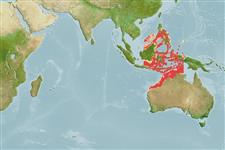Teleostei (teleosts) >
Eupercaria/misc (Various families in series Eupercaria) >
Nemipteridae (Threadfin breams, Whiptail breams)
Etymology: Parascolopsis: Greek, para in the side of + Greek, skolos = stake + Greek, ops = appearance (Ref. 45335).
Environment: milieu / climate zone / depth range / distribution range
Ecology
Marine; demersal; non-migratory; depth range 40 - 250 m (Ref. 58018). Tropical; 15°N - 23°S, 111°E - 135°E (Ref. 3810)
Western Pacific: including the Philippines, eastern Indonesia and northwestern Australia.
Size / Weight / Age
Maturity: Lm ? range ? - ? cm
Max length : 21.0 cm SL male/unsexed; (Ref. 3810); common length : 15.0 cm SL male/unsexed; (Ref. 3810)
Anal spines: 3; Anal soft rays: 7. Body color is pinkish, darker on the back, grading to silvery ventrally. Four dark brownish-pink saddles are on the back, and a pale lemon-yellow stripe is on either side of ventral midline running from the base of the pelvic fins to the base of the caudal fin. The area between the eyes is greenish yellow. A pale mauve stripe joins the eyes through the nostrils.
Occurs offshore. Feeds mainly on benthic invertebrates.
Life cycle and mating behavior
Maturity | Reproduction | Spawning | Eggs | Fecundity | Larvae
Russell, B.C., 1986. Two new species of Parascolopsis (Piseces: Nemipteridae) from North-western Australia, Indonesia and the Philippines. Beagle, Occas. Pap. North. Territ. Mus. Arts Sci. 3(1):137-142. (Ref. 9923)
IUCN Red List Status (Ref. 130435: Version 2024-2)
Threat to humans
Harmless
Human uses
Fisheries: subsistence fisheries
Tools
Special reports
Download XML
Internet sources
Estimates based on models
Preferred temperature (Ref.
123201): 20.5 - 27.8, mean 25.2 °C (based on 127 cells).
Phylogenetic diversity index (Ref.
82804): PD
50 = 0.5002 [Uniqueness, from 0.5 = low to 2.0 = high].
Bayesian length-weight: a=0.01445 (0.00683 - 0.03057), b=2.98 (2.81 - 3.15), in cm total length, based on LWR estimates for this (Sub)family-body shape (Ref.
93245).
Trophic level (Ref.
69278): 3.5 ±0.37 se; based on food items.
Resilience (Ref.
120179): High, minimum population doubling time less than 15 months (Preliminary K or Fecundity.).
Fishing Vulnerability (Ref.
59153): Low vulnerability (16 of 100).
